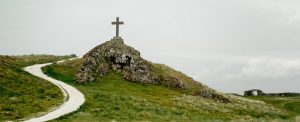Glory to God the Father, the Son, and the Holy Spirit.
Last week we walked with Christ through the Passion and the Cross, Christ’s burial, his plundering Hades and freeing all who were held captive from ages past, so that “Today you will be with me in Paradise” (Luke 23:43). We have celebrated Pascha and proclaimed the resurrection: Christ is risen!
Did you think we were done? Not so fast – today on the Church calendar is named Antipascha, which means Another Pascha. This feast goes on for another month and a half; we are just getting started!
Today is also named the Sunday of Saint Thomas. Last week Christ came and spoke to the other apostles, but by providence Thomas was not there, and afterward he was thoroughly unconvinced by their story of a resurrection. “Unless I see in His hands the print of the nails, and put my finger into the print of the nails, and put my hand into His side, I’m not buying it” (John 20:25).
Is Thomas wrong? He gets stuck with the nickname “Doubting Thomas,” but did you notice last night in the Vespers hymns, we sang: “O good unbelief of Thomas… Thou didst not reject him for his faithlessness. When he saw Thy side and the wounds in Thy hands and feet, his faith was made certain. Having touched and seen, he confessed Thee.”
Because of Thomas’s insistence, we have it made crystal clear that this was no immaterial apparition, but a real, tangible resurrection of the same body that was nailed to the Cross. Transformed, life-giving, deified, but not other than a human body.
I am kind of amused by the academics who have clever little explanations for everything in the Bible… like that Jesus didn’t really rise from the dead… it’s just that his ‘God consciousness’, spirit and memory were so powerful to his followers that when they were together after Jesus died, it almost felt like he was really there with them. ‘Yeah, remember when Jesus was dead but his spirit was so strong that it felt like he grilled us some fish on the beach? Man the memory of that guy can really make a delicious breakfast!’ (Nadia Bolz-Weber).
The lesson we learn from Thomas is not that doubt and reasoning are bad. Rather, we learn that God is not afraid of our honesty. We need to both question authority and also allow the ultimate authority to enlighten us. There are no stupid questions, and I hope no priest will ever tell you “Don’t ask that question.”
There may be questions I’ll tell you are obsessive or missing the point, questions that betray assumptions not based on reality – but Christ is not about to tell you, “Thomas, your question offends me.” Instead, Christ undertakes to start you on the road to knowing him. “Now this is eternal life: that they know thee, the only true God, and Jesus Christ, whom thou hast sent” (John 17:3).
Though Jesus might tell you, “Job, the world is not about you; it’s not an entirely safe or predictable world, but it is becoming what God is making it into. And God invites you to live in that real and wild and beautiful world and to let God earn your trust.” (My very limited paraphrase of the final chapters of the book of Job.)
You know, the certainty that Christ gave Thomas when Thomas’s questions were finally asked and answered launched Thomas on a mission that did not end with his martyrdom in India. Fifteen hundred years after Thomas planted the Orthodox Church in India, when Portuguese explorers and Roman Catholic missionaries arrived in Malabar, they were greeted by indigenous Orthodox Christians. The deposit of faith that was born in Saint Thomas endured.
* * *
One other thing we need to notice in today’s Gospel: This is happening forty days before Christ’s ascension; nearly two months before the coning of the Holy Spirit to all Christians at Pentecost. In a different way and for a different purpose from the baptism in the holy Spirit that Christ sends on the whole Church at Pentecost, here in the upper room, to the Apostles only, Christ breathes the Holy Spirit into them:
“As the Father has sent Me, I also send you.” And when he had said this, he breathed on them, and said to them, “Receive the Holy Spirit. If you forgive the sins of any, they are forgiven them; if you retain the sins of any, they are retained” (John 20:21-23).
“Who can forgive sins but God alone?” (Mark 2:7). “All authority has been given to Me in heaven and on earth,” the Lord says to his Apostles; “You, therefore: Go and make disciples of all the nations” (Matthew 28:18). Christ commissions the Apostles to go in his own authority, and “speak to the people all the words of this life” (Acts 5:20). To speak and to act in the name of Christ, even to the boldness of forgiving sins.
“Is anyone among you sick?” asks Saint James. “Let him call for the presbyters of the church, and let them pray over him, anointing him with oil in the name of the Lord. And the prayer of faith will save the sick, and the Lord will raise him up. And if he has committed sins, he will be forgiven. Confess your trespasses to one another, and pray for one another, that you may be healed” (James 5:13-16).
* * *
In today’s Epistle, we read that “through the hands of the apostles many signs and wonders were done among the people… they brought the sick out into the streets and laid them on beds and couches, that at least the shadow of Peter passing by might fall on some of them. Also a multitude gathered from the surrounding cities to Jerusalem, bringing sick people and those who were tormented by unclean spirits, and they were all healed” (Acts 5:15-16).
Peter’s shadow?
A little later in Acts, we read that “God worked unusual miracles by the hands of Paul, so that even handkerchiefs or aprons were brought from his body to the sick, and the diseases left them and the evil spirits went out of them” (Acts 19:11-12).
Paul’s bandanna? Is scripture attributing miracles to inanimate objects?
To understand what’s happening here, we need to go back to the passage a little earlier in Acts that was read on Friday: The first eight verses of chapter 3.
That’s where Saints Peter and John are on their way up to the Ninth Hour prayers at the temple in Jerusalem. There they see the lame man who used to beg at the temple gate. He asks the apostles for help, and Peter answers, “I haven’t got any money, but I’ll give you what I have” (Acts 3:6).
What’s interesting to me is, Peter does not pray and entreat the lord God to heal the lame man. Peter is full of the Holy Spirit and the power of God, and he knows the will of God, so he himself speaks with authority: “I’ll give you what I have: In the name of Jesus Christ of Nazareth, get up and walk.”
In my mother’s final years, she wanted to be sure her affairs were taken care of, so she signed papers giving me Power Of Attorney. That meant I could write checks on her bank account. The Lord commanded his apostles, “Until now you have asked nothing in My name. Ask, and you will receive, that your joy may be full” (John 16:24). Here’s Peter doing as the Lord commanded: “In the name of Jesus Christ of Nazareth, get up and walk.”
You and I are usually not that certain of the will and plan of God here and now, and we may or may not be overflowing with the miraculous power and activity of God the Holy Spirit. But on this day, Peter was. “What I have, I’ll give you.” Without any pride or delusion, Peter knows God is active in him, knows what God wants done, and he speaks with authority. He exercises power of attorney, speaks in Jesus’s name, and directs the power of God where the Lord wants it used.
Some folks are willing to concede that the saints may intercede to the Lord for us: If God sovereignly lets someone know they need to pray for someone else, then sure, in theory someone who’s now standing before the throne of God could pray for us here and now in our time of need.
But our modern Christianity shies away from the idea that the saints might know the will of God and be so full of his dynamic, wonderworking power that they might simply choose to act. Saint Paul asks, “Do you not know that we shall judge angels? Do you not know that the saints will rule the world?” (1 Cor 6:2,3).
But you know, we need to turn back even further in our Bibles. In the second book of Kings, chapter 13, we see that Elisha, who had raised the dead during his lifetime, has died and been buried in a tomb.
“Now Moabite raiders used to enter the country every spring,” the scripture says. “While some Israelites were burying a man, suddenly they saw a band of raiders; so they threw the man’s body into Elisha’s tomb. When the body touched Elisha’s bones, the man came to life and stood up on his feet” (2 Kings 13:20-21).
The Lord God who was active in Elisha during the days of his life did not stop being active in Elisha’s body after his repose and burial. We have a word for this personal, unstoppable dynamic divine action in people and things: “Grace.”
Grace is What God Does.
Somewhere between western Europe’s Middle Ages and its Reformation, the word Grace was reduced in scope until it represented not much more than an attitude God has: It’s been described as “unmerited favor.” In this mindset, our problem lies in God, who needs to be rendered favorable to us by the sacrifice of Christ. It’s God who needs to change.
But our understanding of Grace is the Holy Spirit personally intervening to empower Peter to command the lame man to stand and be healed. It’s the God of Elisha still active in his bones, so that the dead man is resurrected by the divine dynamis that has never departed from Elisha’s relics.
In fact, let’s roll all the way back to Genesis, where the Lord God formed man out of the earth, and breathed into the clay the spirit of life, and in Genesis 2, “Man became a living soul” (Genesis 2:7).
A human being is not an immaterial soul temporarily imprisoned in limiting or irrelevant flesh. The resurrection of Christ is our promise that we will live eternally in the resurrection, in bodies transformed to be like Christ’s own life-bearing, immortal body. This was always the goal of the creation of mankind.
When you see the word “soul” in the Hebrew Bible, you can usually read it as “person,” or simply “self.” In the Psalm, David refuses to let his feelings limit his choice to give thanks to God: Rather, he says to himself: “Bless the Lord, O my soul. Self, get up and give thanks to God! Why art thou cast down, O my self? and why art thou disquieted in me? hope in God: for I shall yet praise him, my help and my God” (Ps 104:1; 42:5).
Because we understand that man’s body is part of him, we address our Gospel to the whole man: Sacraments and grace that touch body and spirit. Salvation, brought to us in nails and wood and blood, oil and wine and water, and bread and wine transformed into the life-giving, resurrected body of the living God-man.
So it’s no wonder the bones of Elisha remain full of grace, full of the life of God. It’s no surprise that the healing power of Christ is in Paul’s handkerchief, in Peter’s shadow, and in the prayers of the living saints of God before the throne of the Almighty.
“Now to Him who is able to do exceedingly abundantly above all that we ask or think, according to the power that works in us: to him be glory in the church by Christ Jesus to all generations, unto ages of ages. Amen” (Ephesians 3:20-21).






